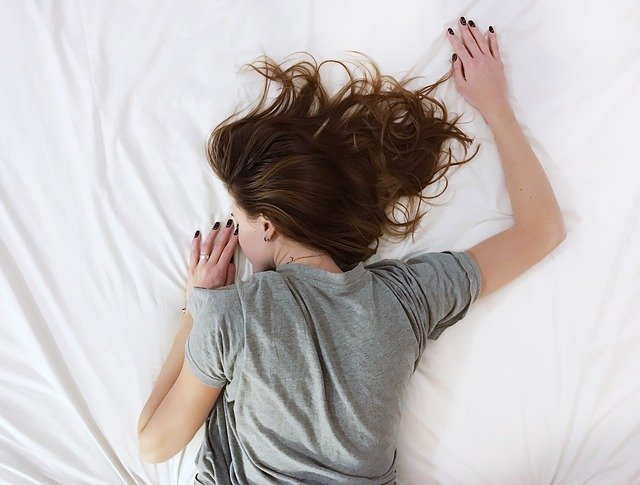- April 24, 2020
- Posted by: Amit Rawat
- Category: Psychology

Sleep disorder is when you have a problem with your sleeping patterns. Either, the person experience sleep deprivation or over-sleeping. In fact, in some cases, sleep walking or sleep talking often disturbs the person.
This disturbance in the sleep pattern affects the normal functioning of the person and leads to sleep disorder. Concentrating on work becomes difficult and in many cases, the person’s family, friends and close relationships also suffer.
I am sure we all have trouble sleeping at some point or other in our life. You might have found yourself awake the whole night or sometimes you might have to force yourself to sleep.
Having trouble sleeping is common these days due to the stress and anxiety that our lifestyle offers. However, sleep deprivation is a serious issue. People who do not get enough sleep are more irritable and perform worse on memory tasks. Sleep deprivation also makes you susceptible to obesity since the body produces a hormone called cortisol which tells your mechanism to make fat. You also produce a hormone that makes you hungry which ultimately results in your weight gain.
Types of sleep disorder
Insomnia
In this type of sleep disorder, a person is unable to get a good night’s sleep. The person always feels sleep deprived and this sleep deprivation starts affecting their life severely. They feel tired all the time and they have huge bags under their eyes. Moreover, they can’t concentrate on their work, relationships and family. They are unable to function properly due to their insomnia sleep disorder.
Sleep deprivation can also increase the risk of depression and heart problems in individuals. One theory is that the sound sleep helps your brain process emotional experiences which in turn can helps protect against depression.
Symptoms and Causes
Pulmonary diseases, psychiatric conditions, stimulants like caffeine, depressants like alcohol or drugs and stress related to work, relationships or environment.
Biological factors also play an important role in insomnia sleep disorder. The person with insomnia might have heightened level of stress hormone called cortisol which plays an important role in waking up the person. Insomnia is also linked to reduced level of estrogens and reduced progesterone which can happen during menopause.
Commonly, people with insomnia self medicate with alcohol or benzodiazepines which can be extremely dangerous. Self medicating in this way can cause many physical and psychological changes that can lead to dependence. Similarly, benzodiazepines especially the short acting ones can also create dependence and it has high abuse potential if someone stops using them.
Treatment
Good sleep hygiene which includes sleeping and waking up on time.
Exercising but not before bed.
Reduce Alcohol
Avoid daytime naps
Avoid caffeine and smoking cigarettes
Don’t go to sleep hungry
Another method is stimulus control in which we use the bed only for sleep and not for other activities like using phone or watching TV. It’s advisable to avoid using screens or listening to loud music before sleeping.
Apart from these suggestions, behaviour therapy is also used to combat insomnia sleep disorder. It includes relaxation techniques and cognitive behaviour therapy. All you need to do consult a great therapist for yourself and she will do the rest.
Sometimes therapists also suggest medications like melatonin agonists, non benzodiazepine sedatives and occasionally benzodiazepines. However, these medications should be taken under expert guidance only.
Narcolepsy Sleep Disorder
In this type of sleep disorder, the person sleeps a lot and about one in two thousand people suffer from narcolepsy. Most of the time, people will have these intense episodes of sleepiness. These episodes of sleepiness and dizziness can last for about 5 minutes, and the worst is that they can occur at any time. Although the cause of narcolepsy is still under investigation, there are indications that it is genetic. It is apparently due to the absence of a neurotransmitter that helps with the alertness suggesting.
Symptoms and causes
At one time or another, you probably have to force yourself to stay awake. In narcolepsy sleep disorder, people lose the ability to regulate the sleep wake cycles and hence, the normal boundary between being sleep and awake gets blurred. This leads to characteristics of sleeping while the person is awake.
In the brain, there are special group of neurons that increase the state of being awake and they extend from lateral hypothalamus to reticular activating system or RAS. In people with narcolepsy sleep disorder, these special neurons are in lesser number and each of the neuron carries less OREXIN A and OREXIN B which are the nueropeptides that increase the activity of wake promoting regions of the brain. These neurons and neuropeptides prevent inappropriate transitions to sleep.
Daytime Sleepiness
Narcolepsy sleep disorder is characterised by daytime sleepiness where people feel chronically sleepy. They get sleep attacks where they doze off with little warning and sometimes inappropriately. People with narcolepsy quickly fall asleep and they can have vivid dreams even if they fall asleep for a short period of time.
Cataplexy
The second system that develops over time is cataplexy where some strong emotion like laughter or anger triggers a transient muscle weakness. This transient weakness can be partial like in the neck, face or knees or it could be severe like total body weakness or paralysis.
The people are usually conscious during cataplexy and it resolves in few minutes.
Hypnogogic hallucinations
These hallucinations are often vivid, tactile or auditory that happen when the person falling asleep. They probably results from a mixture of wakefulness and the dreaming simultaneously.
Hypnopompic hallucinations
Another characteristic of narcolepsy sleep disorder are the hypnopompic hallucinations which are similar to hypnogogic hallucinations except that they happen upon awakening. Although, these are less likely to occur, they can happen with narcolepsy.
Sleep paralysis
The final key symptom of narcolepsy sleep disorder is sleep paralysis which is the complete inability to move for a few moments or few minutes immediately after awakening or just before falling asleep. During sleep, the brain is active but the body is generally paralyzed.
The sleep paralysis is even more frightening when it is accompanied with hypnopompic hallucinations and sensations of suffocations
In narcolepsy, only few people or minority have all the symptoms and that is why the diagnosis becomes difficult or it is easy to confuse with other sleep disorder.
Treatment
There is no treatment for narcolepsy. However, there are some medications which can help to manage the symptoms like stimulants or antidepressants.
Sleep Apnea Sleep Disorder
One of the most common sleep disorders is sleep apnea. This is scary due to the fact that the people with this sleep disorder are unaware of their condition. In this disorder, the people stop breathing while they sleep. After about a minute of breathlessness, your body realizes that you are not getting enough oxygen and then you wake up just long enough to gasp a breath of air. However, as soon as you get the oxygen, you fall back asleep without even realizing what happened.
Interesting and scary thing is that this can happen 100s of times in a night without you realizing nothing. This disturbance in the sleep can be really tiring as your body does not get the right amount of rest. You always wake up with fatigue and bags around your eyes. You feel sleepy at work and do not what is the reason then you might be suffering from sleep apnea.
Symptoms and causes
Sleep Apnea: Night time symptoms
Snoring
Pausing of breathing
Restless sleep
Waking up frequently
Frequent urination
Frequent mouth opening
Sleep Apnea: Wake-up symptoms
Dry mouth
Sore throat
Drooling
Morning headache
Exhausted
Sleep Apnea: Day-time symptoms
Mental fog
Decreased memory
Decreased attention
Sleepiness
Tiredness
Anxious
Mood swings
Sleep walking or sleep talking sleep disorder
Another type of sleep disorder that we are going to address is sleep walking which is common and like narcolepsy, it is genetic. This is mostly harmless as long as you don’t walk yourself in a dangerous situation or talk about your deep dark secrets. Sleep walking or sleep talking is mainly found in children and as they grow up, the condition improves.
Final words
The sleep disorders in an individual are the result of either the biological factors, physical or mental health factors. The person who feels that they have disturbed sleeping patterns or they are experiencing some issues during their must visit their physician to get their body checked.
Apart from a person’s physical health, the chances are highly likely that the person is experiencing issues related to sleep due to some mental health issues. In the modern times, stress has contributed a lot to mental health issues like depression, OCD, anxiety issues and other mental health problems. In many cases, it is observed that the sleep disorder is the by-product of these mental health problems.









